
The tiniest bits of plastic floating in our oceans might be more dangerous than we ever imagined—especially after passing through certain marine creatures. A new Nstudy by Tel Aviv University has unveiled that filter-feeding organisms, like ascidians, unintentionally amplify the threat of microplastics. These findings show how plastic pollution transforms within marine ecosystems, creating a ripple effect of dangers for ocean life.
Small marine creatures called ascidians, which are well-known for filtering water for food, are surprisingly involved in this process. Two types of microplastics—polystyrene, a common plastic, and polylactic acid, a so-called biodegradable plastic—were released into the water as part of a controlled study. Ascidians effectively filtered and digested these particles, but the consequences were concerning. While polylactic acid broke up into untraceable nanoparticles, polystyrene particles were released back into the water essentially unaltered. These tiny particles have a higher chance of getting into the food chain and doing damage.
What’s even more concerning is that microplastics transform digestion. Coated with a fecal layer, these particles disguise themselves as organic material, making them attractive to other marine organisms. This transformation also promotes bacterial growth and allows harmful substances like heavy metals to stick to the particles, turning them into toxic carriers.
The effects don’t stop there. Feces containing microplastics sink rapidly, disrupting the flow of nutrients in marine ecosystems. This leads to localized pollution on the ocean floor, fueling algal blooms and harming marine biodiversity.
This study is a stark reminder of how deeply plastic pollution infiltrates marine environments. To combat this crisis, we need innovative waste management solutions and eco-friendly materials that don’t fragment into harmful particles, safeguarding our oceans for generations to come.
